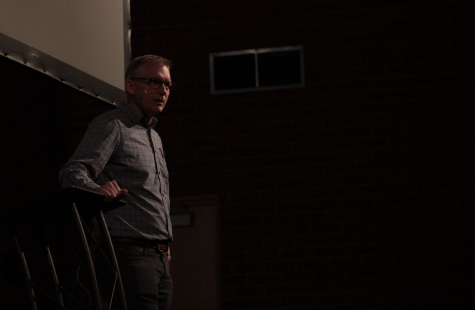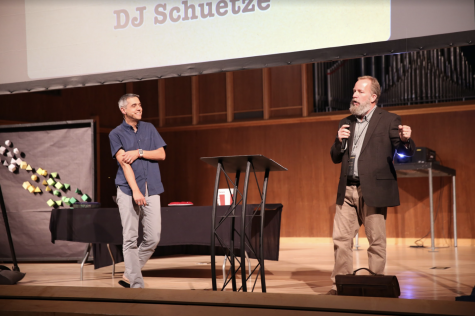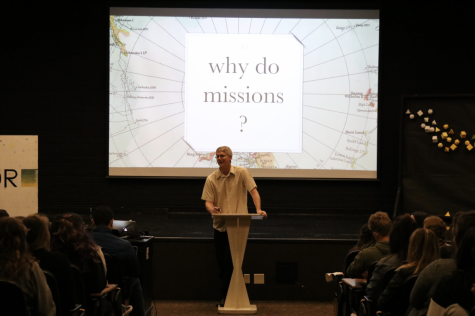“Dark Knight Rises” not as dark as people say
Jeff Koch dissects Christopher Nolan’s summer hit flick, “The Dark Knight Rises.”
September 24, 2012
People say that a serious discussion of the creative arts is a waste of time. It is easy to dismiss a critical analysis of things like "themes," "pacing" and "characterization" as meaningless efforts. After all, who cares? It's just entertainment. Isn't it?
In this media-saturated age, we are constantly bombarded with messages, meaning and subtext in all the entertainment we cherish.
This isn't a bad thing, necessarily. For centuries, humanity has used art to convey ideas in a powerful, reactionary way. This is why Biola invests so heavily in its film school, for example: so that folks with Christ in their hearts may enter a world the heart of which is decidedly more sinister.
Art and culture change the way that people think, often without us noticing it. It can even happen right here, in our own little Biola bubble, because this bubble is a semi-permeable membrane. No matter what you think about your isolation here, influence creeps in from the outside.
And I suspect it has in a way you've not even considered.
I have read countless reviews, Facebook posts and tweets lauding the last installment of director Christopher Nolan's "Dark Knight" trilogy: “The Dark Knight Rises.” They say it's a great movie, with incredible special effects, talented actors and an incredibly dark, grim plot rife with tragedy and defeat.
Far be it from me to challenge this. Nolan is an incredible director who's succeeded again in creating a compelling, meaningful drama out of the Batman franchise. Cinematically, it's one of the best films of the year.
It's the aforementioned "darkness" I take issue with. Not because darkness in cinema is bad — but because, in “Rises,” it isn't there.
Allow me to quote film critic MaryAnn Johannson in her review of "Rises."
"'The Dark Knight Rises' may be the darkest, the grimmest, the most depressing summer popcorn movie ever … there can be no mistake that the people of Gotham are us … frantic for a hero we will not find."
Such accounts of "Rises'" supposed grim, depressing darkness continue to resound throughout the Twittersphere and the other, various spheres of human communication, and it makes me wonder: Did they see the same movie I did?
[Spoilers of the greatest magnitude await the reader who carries on.]
Batman, after a long absence, finally makes good on his promise to return to Gotham's aid. To rescue the people who are utterly trapped and unable to save themselves, Batman returns boldly to the fray. He must find a way to defeat the evil and to rid Gotham of the time bomb that will inevitably destroy the city and everyone in it when it reaches 00:00. To do this, Batman pledges to give the city "everything" he has. In the end, Batman selflessly takes the blow wholly upon himself, and becomes the only victim of an evil that would've destroyed everyone had he not had the courage to act. The city thankfully yet mournfully remembers a man who gave the ultimate sacrifice for them until — as if by magic — Wayne suddenly appears, leaving another protector behind to take up the mantle.
Sound familiar?
I don't know how many days passed between the time Batman carried the bomb out to sea and the moment when Alfred met his eyes in the café — but if I had to guess, I'd say three.
Nolan’s Batman is the perfect Christ figure.
Using abilities only he possesses, Batman saves a world that betrayed him and conquers the evil that beset them — and came “back to life” after what should have been a death sentence.
This is the hopeless, grim, depressing, tale of the missing hero? This is darkness?
This is not darkness, but service, duty and love in action.
Yet the culture that says that sacrifice is grim, heroism weakness and death the least desirable of all outcomes has bogarted this film and foisted on us a new idea of "darkness."
Even the tone of the film itself is harsh and foreboding. It actually makes the movie worse, thematically, to have Wayne survive. Had he died, at least then the darkness in tone would be justified in proclaiming the final stand of the Batman, heralding a new, Batman-less age for Gotham. But not even that speck of grey gets left on this silvery-white screenplay.
The result is a movie not nearly as dark as it wants to be — and nobody seems to notice.
This is why we must be critical of culture: This disconnect between tone and message has allowed labels to be applied where they do not belong. The sacrifice of one man for a city he loves and protects is not "darkness." When Batman is unable to defeat evil; when Bane is victorious and Batman returns, body broken, to the pit; when the Joker lets chaos decide who will live or die in the name of "anarchy"; under these circumstances we can apply the term "darkness." Here, it has no business.
Need we be reminded what biblical, God-fearing love looks like, even in fictitious Gotham? In the final hour of "Rises," Batman becomes the ultimate hero. He stands for nothing but justice and the betterment of his fellow man. For the first time in the entire trilogy, he forsakes himself to the utmost, leading at last to his utmost sacrifice.
What, exactly, is so dark about that?
"Greater love has no one than this, that one lay down his life for his friends." — John 15:13






